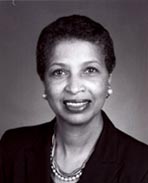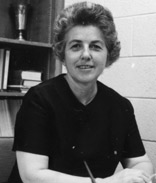|
Cut from the same cloth
by Juliet Crichton
|
When Tech's Harper Hall was dedicated in October 1999, Linda Edmonds Turner (clothing and textiles '70, M.B.A. '75, Ph.D. business administration '79), now the president of Urban College of Boston (UCB), was invited to speak about the woman she calls her "true mentor," the late Professor Emeritus and Dean Emeritus Laura Jane Harper of the College of Home Economics (now part of the College of Liberal Arts and Human Sciences).
|
 |
 |
|
Linda Edmunds Turner
|
Laura Jane Harper
|
Originally from rural Halifax County, Va., and a member of Tech's first class of black women in 1966, Turner came to know Harper, a feisty Mississippian, as a committed educator and forward thinker who always treated her students fairly. "I don't know if I would be sitting here today with a Ph.D. if it hadn't been for Dean Harper. My family respected education, but nobody in my family knew the world of higher education or aspired to be a Ph.D."
Perhaps the two had more in common than either could comfortably articulate in the '60s, for Harper understood minority status firsthand, having arrived at Tech in 1949, when females were a rarity on campus. A nutrition scholar and the university's first female academic dean, Harper introduced study abroad and extended campus programs, as well as equal educational opportunities that included male faculty and students in home economics, the commission of women in the ROTC programs, and the establishment of the very first career guidance program at the university.
After two quarters of study at Tech, Turner had taken to Harper's no-nonsense approach--"she wasn't fake"--and asked the dean for a part-time position. Turner worked first with Harper's administrative staff and later with the dean as her undergraduate teaching assistant. "I thrived with her kind of guidance, also the responsibility she gave me. That woman continued to groom me, but I didn't even know it was happening," Turner admits.
Harper also "planted the seed for graduate school," and Turner chose the dean's alma mater, Michigan State, graduating with a master's in general ecology. Then, working as a home economist for the Whirlpool Corporation, she began taking evening classes in business at MSU and wrote Dean Harper for some career advice. In response, Dean Harper offered a graduate assistantship to Finland and encouragement to begin doctoral studies at Tech. Getting the Ph.D. "was a pain," Turner says, because "I had to work much harder for A's than I did at the undergraduate level. I never appreciated how hard it was for some people in a subject until I finally failed something," a perspective that has likely remained important in her professional endeavors.
Before taking the helm at UCB, Turner held "very rewarding jobs in higher education and corporate America": vice president and chief marketing officer for Dean College in Franklin, Mass.; senior marketing manager for new business development at the Polaroid Corporation; and 10 years in marketing for DuPont, during which she was one of nine professionals selected to participate in Harvard University's year-long pilot Administrative Fellows Program for university administrative exposure. In addition, until accepting the UCB position in late 2002, Turner was a partner in Crew & Turner Consulting, providing marketing, new-product development services, consumer research/data analyses, and media program design services to the firm's clients.
Beyond her skills as a marketing strategist, budget manager, and administrator, Turner brings valuable life experience to UCB's campus, where inner-city residents of differing ages, ethnicities, and socioeconomic backgrounds see their goals through to fruition. With a mission "to provide post-secondary educational and professional mobility to members of the urban community who have been traditionally underserved by higher education," UCB is fully accredited by the New England Association of Schools and Colleges to grant two-year associate of arts degrees in human services administration, early childhood education, and general studies, and offers a variety of certificate and continuing education programs.
In addition, by way of the college's ongoing partnership with its founding organization, Action for Boston Community Development (the city's official antipoverty agency that promotes self-help through community action, education, and training), UCB makes available comprehensive support services, including daycare, health services, personal counseling, and job placement, to its more than 700 students each semester. Many graduates go on to one of the eight schools that accept UCB courses for transfer toward a bachelor's degree, among them the University of Massachusetts-Boston, Springfield College, and Suffolk University.
Especially innovative is UCB's--and Boston's only--comprehensive bilingual early education courses in both Spanish and Cantonese, a multicultural curriculum that reaches out to Boston's diverse population and assures an inclusive student body. Turner notes that UCB is "a national model for providing non-traditional students access to higher education in an environment and with the support systems that enable them to stay in school, graduate, and go on to make a difference for themselves, their families, and their communities." This mission, upheld by the college's professors and administrative staff, "a dedicated bunch of people," Turner says, has earned UCB nearly $4 million in federal funding from the U.S. Department of Education.
"That [student] who has had to struggle to get into college deserves respect, too," Turner asserts, and offering him or her that respect is instrumental in carrying out UCB's mission. Turner says that her "interactions with the students and seeing them succeed, sometimes against some very high odds," pleases her the most about her new position. "My office is near our Learning Resource Center where many of them come to work on their various class projects. They inspire me!"
"All my jobs leading to this one have had some element of marketing, launching new ideas," says Turner, who lives in Milton, Mass., with her husband and son. "I like integrating new ideas into any assignment. Combining marketing and higher education administration is a very comfortable fit for me. What better and more important new products than students?"
No doubt, Dean Harper would agree.
To learn more about the Urban College of Boston, visit www.urbancollege.edu. Read Turner's 1996 interview with Elaine Carter, part of The Black Women at Virginia Tech History Project, online at spec.lib.vt.edu/archives/blackwomen.
|

